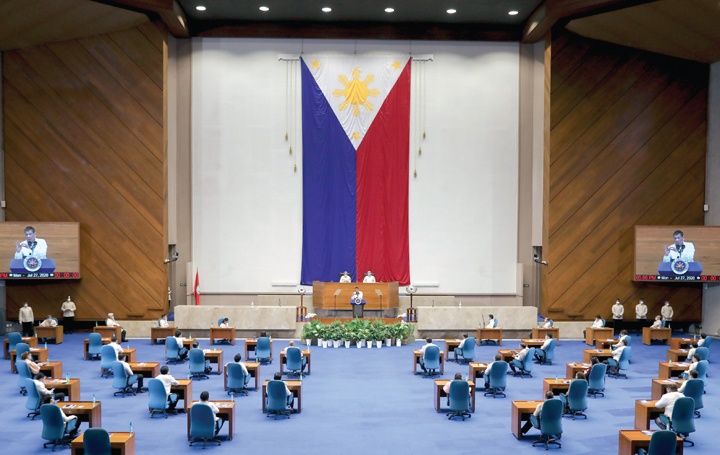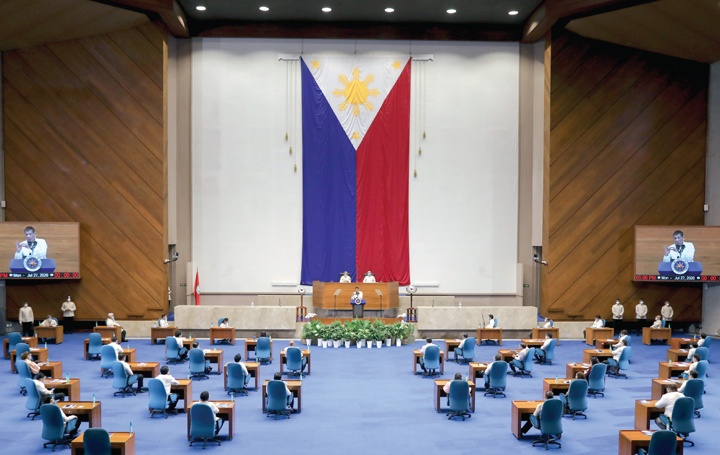
The House of Representatives on Wednesday endorsed for Senate approval President Rodrigo Duterte-backed measures creating for Virology Institute of the Philippines (VIP) and Philippine Centers for Disease Prevention and Control (CDC).
This, after members of the lower chamber approved on third and final reading House Bill (HB) 9560 or the Philippine Center for Disease Prevention and Control Act and HB 9559 to establish the Virology Institute of the Philippines.
During his final State of the Nation Address (SONA) last Monday, President Duterte pushed for the passage of the said two measures.
House Committee on Health Chairperson and Quezon Rep. Angelina Tan, one of the principal authors of CDC bill, said the creation CDC is urgently necessary as the country, just like most of health systems in the world, is ill-prepared to address the challenges of pandemics such as the COVID-19.
“The bill seeks to modernize the country’s capabilities for public health emergency preparedness and strengthen the current bureaucracy that is mandated to address communicable diseases in the country through organizational and institutional reforms,” Tan said.
“To better prepare against public health emergencies, we need to embark on two essential initiatives: health modernization and institutional reforms. We cannot merely keep on rearranging the boxes within our health organization without capacitating our health personnel and resources. That will not work. We need to modernize and reorganize our health system at the same time to protect the public from health risks,” Tan added.
The bill mandates necessary reforms in the recruitment, training, employment and management of the country’s public health emergency personnel; development of relevant programs for the acquisition and upgrading of appropriate technologies, laboratories, and equipment; and provision for the needed relocation, improvement, and construction of facilities to enhance the country’s preparedness and response to public health emergencies.
Once enacted, the CDC will be created as an attached agency to the Department of Health (DOH) and serve as the principal agency mandated to develop and apply communicable disease prevention and control initiatives. It will serve as the technical authority on all matters regarding disease prevention and control.
It will remove the function of addressing the communicable disease concerns from the DOH and transfer this mandate to the CDC, after absorbing the existing Epidemiology Bureau; Research Institute for Tropical Medicine (RITM); Sexually Transmitted Disease – Acquired Immune Deficiency Syndrome (STD-AIDS) Cooperative Central Laboratory; Select functions of the International Health Surveillance Division of the Bureau of Quarantine such as the passive international health surveillance and development of communication methods for wider and more effective delivery of critical public health information with international importance; Technical and standard setting functions of the Disease Prevention and Control Bureau including that of the Mental Health Division, Cancer Division and Oral Health Division.
The CDC will be imbued with the following powers, functions, and duties: Policy and Standards Development; Capacity Building and Technical Assistance; Sectoral and Local Engagements; Surveillance; Technical guidance on the monitoring and evaluation framework for disease prevention and control; and Certify the existence of an epidemic which shall be treated as a public health emergency, among other functions as may be mandated by law.
Virology institute
For his part, House Committee on Ways and Means Chairman Joey Sarte Salceda, principal author of the HB 9559 or the VIP bill, said the VIP will become the premier research and development institute in the field of virology, encompassing all areas in viruses and viral diseases in humans, plants, and animals.
He said the VIP will become the research and development unit while Research Institute of Tropical Medicine (RITM) will be the medical laboratory.
The VIP’s campus in New Clark City is part of the priority programs under the Build, Build, Build program of the Duterte administration.
“The measure will help not only create a vaccine for COVID-19, but also for the other virus-related threats we face, such as the African swine fever. With climate change and the destruction of natural habitats, we will really face more zoonotic viruses, or those viruses that climb from animals to human hosts,” said Salceda.
“It shall act as a venue for scientists, both here and abroad, to work collaboratively to study viruses of agricultural, industrial, clinical, and environmental importance,” he added.
According to Salceda, President Rodrigo Duterte has ordered the Department of Budget and Management (DBM) to include the funding for VIP in the executive’s budget proposal for 2022.
“VIP will be dedicated exclusively to the broadest and deepest possible exploration of everything we need to know about viruses that can affect the country, and more importantly, how we can prepare for them, as well as what opportunities lie in the research,” he said.
Stockpiling Act
Also, approved on third and final reading is House Bill 9456 or the Health Procurement and Stockpiling Act.
Rep. Tan said the bill seeks to protect public health by addressing the problem of access to critical drugs and medicines, vaccines, devices, and materials in times of public health emergencies.
“The COVID-19 pandemic has shown the need to preposition critical and strategic pharmaceuticals and medical devices as well as the supply of raw materials. The country needs to be proactive in its response to public health emergencies,” said Tan.
The bill will create the Health Procurement and Stockpiling Bureau under the Department of Health (DOH). It will absorb the existing Procurement Service and the Supply Chain Management Service and serve as the principal agency mandated to undertake a transparent, fair, proactive, and innovative procurement service for the DOH. It will also be tasked to stockpile, conserve, and facilitate the release of adequate amounts of potentially life-saving pharmaceuticals, vaccines, devices, and materials in times of public health emergencies.
Among its critical functions include the identification of strategic and critical drugs and medicines, vaccines, devices, and materials needed for public health emergencies that have the distinct capability of being stockpiled in strategic and secure areas of the country; supplementation of drugs and medicines, vaccines, devices, and materials to state supplies acting as a stopgap buffer when the immediate supply of adequate amounts of drugs and medicines, vaccines, devices, and materials may not be immediately available; and ensuring the rotation, replenishment, and freshness of stocks and that there exists at all times steady, available and adequate supply of drugs and medicines, vaccines, devices, and materials, which are essential in responding to public health emergencies.
The Health Procurement and Stockpiling Bureau will also lead in facilitating the creation of a conducive environment to encourage pharmaceutical and device self-sufficiency for medical supplies needed by the country and spearhead the crafting of a multi-sector National Drug and Device Security Program geared towards the country’s self-reliance in producing drugs and medicines, vaccines, devices, and materials.
Tan pointed out that based on the Joint External Evaluation (JEE) Mission report, the Philippines, due to its location, is one of the most natural-disaster prone countries in the world and in the past decade the country has faced challenges in making solid progress in infectious disease control. She said that “Given this situation, the country’s preparedness in times of public health emergencies is significantly necessary such as during pandemics and natural disasters.”

